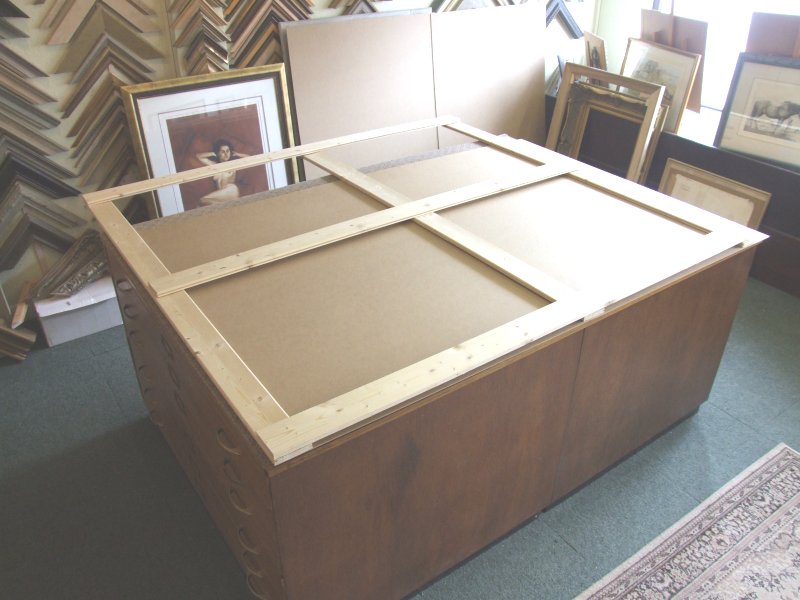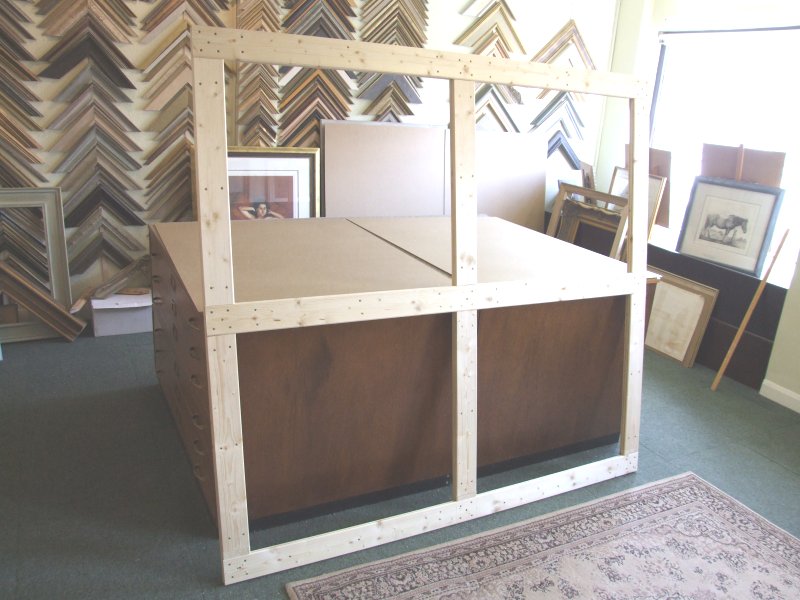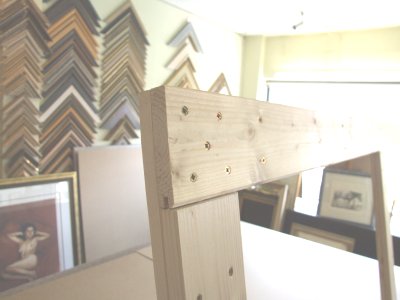Hello,
I am framing a very large print and making a subframe. What are the best tried and tested methods for fixing the subframe together and for fixing it to the moulding?
I was thinking lap joints or biscuit joints for the frame itself. Any advice would be great.
Thanks
Subframe fixing methods
-
gabrielleheysemoore
- Posts: 14
- Joined: Mon 13 Aug, 2018 1:18 pm
- Location: PENGE, LONDON
- Organisation: GABRIELLE HEYSE-MOORE
- Interests: PICTURE FRAMING, INTERIOR ARCHITECTURE, FURNITURE
-
Not your average framer
- Posts: 11008
- Joined: Sat 25 Mar, 2006 8:40 pm
- Location: Devon, U.K.
- Organisation: The Dartmoor Gallery
- Interests: Lost causes, saving and restoring old things, learning something every day
- Location: Glorious Devon
Re: Subframe fixing methods
I don't think that you can say that the fixing method will always be the same in every situation, as there will times when you will need to vary the method used. If the frame includes glazing, it would make sense that the method of fixing allows for easy and damage free removal of the subframe. Therefore I would suggest the use of screws is preferable to nails, or staples.
Generally, I make up subframes fron either whatever is in stock that will do the job, or wood batterns from my local hardware shop. These are cut on the Morso and joined on the underpinner and if necessary cross pinned at each corner join using an 18 gauge air powered nail gun. The nail gun is quick, easy and fires nails up to 50mm long if required.
It is worth mentioning that nail gun pins can be diverted by the grain in the wood, so it's not always a good idea to use pins that are too long, or too near the the outside edge of the wood.
Generally, I make up subframes fron either whatever is in stock that will do the job, or wood batterns from my local hardware shop. These are cut on the Morso and joined on the underpinner and if necessary cross pinned at each corner join using an 18 gauge air powered nail gun. The nail gun is quick, easy and fires nails up to 50mm long if required.
It is worth mentioning that nail gun pins can be diverted by the grain in the wood, so it's not always a good idea to use pins that are too long, or too near the the outside edge of the wood.
Mark Lacey
“Life is short. Art long. Opportunity is fleeting. Experience treacherous. Judgement difficult.”
― Geoffrey Chaucer
“Life is short. Art long. Opportunity is fleeting. Experience treacherous. Judgement difficult.”
― Geoffrey Chaucer
-
gabrielleheysemoore
- Posts: 14
- Joined: Mon 13 Aug, 2018 1:18 pm
- Location: PENGE, LONDON
- Organisation: GABRIELLE HEYSE-MOORE
- Interests: PICTURE FRAMING, INTERIOR ARCHITECTURE, FURNITURE
Re: Subframe fixing methods
Thanks,
This is really useful advice and I agree about the easy removal of the subframe.
Gabrielle
This is really useful advice and I agree about the easy removal of the subframe.
Gabrielle
-
Justintime
- Posts: 2004
- Joined: Sat 26 Sep, 2015 8:48 am
- Location: West Wales
- Organisation: George The Framer LLP
- Interests: Gardening, design, electronic music, good food and beverages.
- Contact:
Re: Subframe fixing methods
I'm new school. I buy subframe from Rose and Hollis (A345)or Wessex (PW219). Cut and underpin and screw into the inside of the frame.
Justin George GCF(APF)
Insta: georgetheframer
Insta: georgetheframer
- David McCormack
- Posts: 1442
- Joined: Tue 02 Aug, 2011 10:14 am
- Location: South Lakes
- Organisation: Framing
- Interests: Cycling, walking, darkroom photography and laughing a lot!
- Location: Cumbria
- Contact:
Re: Subframe fixing methods
I must go to the same school as Justintime 
Here are some photos of the Wessex subframe in use (PW219) the frame is about 90x110cm
I just cut and join as any other moulding... plenty of glue and V nails.
The pre cut groove in the subframe allows for easy attachment to your frame with screws.
This style of subframe can solve three problems in one go:
1.Holds the package in securely
2.Adds strength to your corners
3.Provides an elegant solution to hang the frame on the wall (French cleat system)
Here are some photos of the Wessex subframe in use (PW219) the frame is about 90x110cm
I just cut and join as any other moulding... plenty of glue and V nails.
The pre cut groove in the subframe allows for easy attachment to your frame with screws.
This style of subframe can solve three problems in one go:
1.Holds the package in securely
2.Adds strength to your corners
3.Provides an elegant solution to hang the frame on the wall (French cleat system)
"You know, there's a right and wrong way to do everything!"
Oliver Hardy.
https://www.instagram.com/davidaustinmccormack/
Oliver Hardy.
https://www.instagram.com/davidaustinmccormack/
Re: Subframe fixing methods
If you need a seriously strong subframe I have a sneaky method.....
Get some thin, wide pine. I use pine cladding which is 8mm thick and about 90mm wide. Saw or plane off the tongue and groove.
By laminating two boards it allows you to form a half-lap joint which is far stronger than a mitre joint. Simply square-cut 4 pieces
the full length of each side and lay them down on the bench and put a screw in each corner. Measure diagonally to make sure it's
square and then remove each screw in turn and apply glue. Put the screw back and add a few more as appropriate.
Then it's just a question of adding another layer (plenty of glue) to make the whole thing level.
You can also add cross bars using similar lap joints.



* A pocket hole jig is handy to set the screws into the outer frame. Wish I had one.
Wish I had one. 
Get some thin, wide pine. I use pine cladding which is 8mm thick and about 90mm wide. Saw or plane off the tongue and groove.
By laminating two boards it allows you to form a half-lap joint which is far stronger than a mitre joint. Simply square-cut 4 pieces
the full length of each side and lay them down on the bench and put a screw in each corner. Measure diagonally to make sure it's
square and then remove each screw in turn and apply glue. Put the screw back and add a few more as appropriate.
Then it's just a question of adding another layer (plenty of glue) to make the whole thing level.
You can also add cross bars using similar lap joints.



* A pocket hole jig is handy to set the screws into the outer frame.
Watch Out. There's A Humphrey About
-
Not your average framer
- Posts: 11008
- Joined: Sat 25 Mar, 2006 8:40 pm
- Location: Devon, U.K.
- Organisation: The Dartmoor Gallery
- Interests: Lost causes, saving and restoring old things, learning something every day
- Location: Glorious Devon
Re: Subframe fixing methods
Unfortunately, there are customers who insist upon using wholly unsuitable mouldings which often need a sub frame, but the moulding either has inadequate rebate depth, or not enough width of moulding to take a screw of sufficient size to give adequate strength of fixing. That's when you have to invent other solutions.
Sadly too many mouldings have rebates that are far to shallow and this happens much more often that I think is necessary.
Sadly too many mouldings have rebates that are far to shallow and this happens much more often that I think is necessary.
Mark Lacey
“Life is short. Art long. Opportunity is fleeting. Experience treacherous. Judgement difficult.”
― Geoffrey Chaucer
“Life is short. Art long. Opportunity is fleeting. Experience treacherous. Judgement difficult.”
― Geoffrey Chaucer
-
gabrielleheysemoore
- Posts: 14
- Joined: Mon 13 Aug, 2018 1:18 pm
- Location: PENGE, LONDON
- Organisation: GABRIELLE HEYSE-MOORE
- Interests: PICTURE FRAMING, INTERIOR ARCHITECTURE, FURNITURE
Re: Subframe fixing methods
Thanks everyone. Very helpful.
Justintime and David McCormack, these subframes are perfect for this application. Will use these this time.
Gabrielle
Justintime and David McCormack, these subframes are perfect for this application. Will use these this time.
Gabrielle
